Overseas media continuously forwarded the international sharp comments on Sino-US economic and trade frictions from the reception desk.
CCTV News:On May 9, 10 and 11, the "International Critical Review" of the Central Radio and Television General Station was continuously published entitled "Talking about fighting may become the normal state of Sino-US economic and trade friction.》《The attempt to use the Taiwan Province issue to contain China’s adventure is bound to be a dead end.》《Tariff stick harms others and harms oneself.》《The key to solving Sino-US economic and trade frictions lies in taking care of each other’s concerns."and other four articles on Sino-US economic and trade frictions. Many overseas media and websites have been forwarded one after another.
From 9 to 12 May, European Times German website, British Al Araby TV (British Al Araby TV), Italian Radio We website (facebook account, twitter account), German Tagesschau 24 (German Daily News 24 TV), German-Chinese Report German website, Russian newspaper website, ORF2 Bundesland, Austria (Channel 2 of Austrian Broadcasting Corporation), Rainbow FM website in Lisbon, Portugal, Czech NovaTV Czech HD (Czech Nova TV), Czech Prima TV (Czech Prima TV), Slovak TV Markiza (Slovak Makisa TV), Turkish Economic Observation Network, Albanian National Radio and Television website, Japan’s Record China website, Japan’s Niconico website, Japan’s Oricon website, Japan’s NewsCollect website, and Korea’s OBS (Korea’s Jingren TV Station)., India’s Daily Morning News website, Iran’s instant messaging network, Iranian people’s road network, Kazakhstan’s "Industry News" website, Pakistan-China Friendship Network, Jordan Global Radio facebook account, Nepal’s Capital FM92.4 urban FM website, Myanmar opinion leader media facebook account, Brazil’s Rio headline radio station website, Brazil’s Sao Paulo World Radio Station website, Nigeria’s "Leader", Dozens of overseas media, such as Chinese PT portal, Chinese headline APP, Portuguese New Newspaper APP(facebook account, twitter account), Nordic Times website, European Union Chinese website, Africa Times website, West Africa online website, Japanese Chinese business website, Hong Kong Commercial Daily website and so on, have widely forwarded it. Hong Kong Ta Kung Pao and Wen Wei Po also published related articles.
The contents of "International Sharp Review: Talking about Fighting, Maybe Becoming the Normal State of Sino-US Economic and Trade Friction" are as follows:
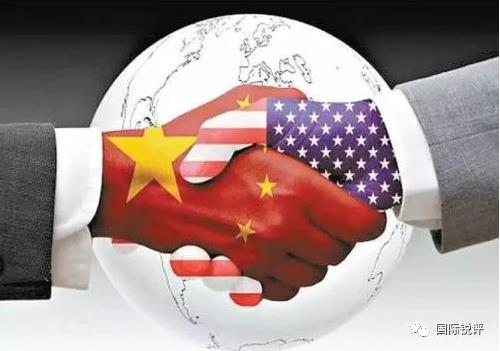
The Office of the U.S. Trade Representative announced on Wednesday (8th) that it plans to raise the tariff on 200 billion U.S. dollars of goods exported from China to the United States from 10% to 25% this Friday (10th). In this regard, China responded quickly, pointing out that escalating trade friction is not in the interests of the two peoples and the people of the world. China deeply regrets this. If the US tariff measures are implemented, China will have to take necessary countermeasures.
Comparing the statements of China and the United States, there are two points worthy of attention:
First, the content of the tariff increase in the US statement is similar to the information released two days ago, but the focus is on "planning", that is, "planning". Since it is "intended" to raise tariffs, this means that the possibility of changing your mind will not be ruled out in the future.
Second, the Chinese side responded quickly. After about two hours, it responded briefly, but its attitude was clear and firm. The Chinese statement of more than 80 words contains three meanings: first, it points out that the negative impact of the US move is "not in the interests of the two peoples and the people of the world"; Then it shows China’s attitude: "I deeply regret"; Subsequently, the Chinese side showed that the action "will have to take necessary countermeasures", of course, this premise is "if the US tariff measures are put into practice".
On the eve of the eleventh round of high-level economic and trade consultations between China and the United States, the two sides issued the above statement, which is intriguing. The United States has obvious intention to pressure the asking price, while China has responded quickly and calmly, which shows that China is well prepared and reflects its consistent principled position, namely: talk, the door is open; Fight, fight to the end.
From this, people should see that talking about fighting and fighting while talking may have become the mode and normal state for China and the United States to solve economic and trade frictions.
Since February last year, Sino-US economic and trade consultations have made positive progress, but there have been many repetitions in the middle. This time, before the two sides started talking, the US suddenly announced that it would upgrade tariffs. As a spokesman for China’s Foreign Ministry said, similar situations have occurred many times before. China has long been accustomed to it, so it will naturally face it calmly. When it sees a move, it will talk about it, and if it is countered, it will be countered.
In fact, when announcing the tariff escalation, the US side also indicated that there is still a chance for the two sides to reach a historic agreement, and said that the two sides are preparing for the meeting between the two heads of state after the agreement is reached. Behind this seemingly contradictory move shows that China and the United States are constantly adjusting their contacts by talking about the mode and normality of solving economic and trade frictions, so as to narrow their differences and expand their consensus.
Against this background, it is not difficult for people to understand why the Political Bureau of the Communist Party of China (CPC) Central Committee, Vice Premier the State Council and Liu He, the Chinese leader of the China-US comprehensive economic dialogue, decided to go to the United States on invitation to attend the 11th round of China-US high-level economic and trade consultations from 9th to 10th. It’s not that China is afraid, or even forced to make concessions. It’s that China has long understood and adapted to the normal situation of settling economic and trade frictions between China and the United States, so it can grasp the general direction of the consultation process from a higher level instead of being disturbed by one thing at a time.
It is China’s consistent principled position to resolve contradictions and differences through negotiations. Ten rounds of high-level economic and trade consultations between China and the United States have passed, and the two sides have made substantial progress in trade procurement, structural issues, implementation mechanisms, etc. It is not easy and needs to be doubly cherished, but at the same time there are still problems that need further discussion. Therefore, at the end of the tenth round of high-level consultations, the two sides agreed to hold the eleventh round of consultations in Washington this week to continue the discussion. Although the United States has not played its cards according to common sense, which has caused great confusion to this round of consultations, China cannot be affected by this. Going to the United States for consultations as planned is China’s respect for the negotiation rules and the consensus reached by the two sides in the past 16 months.
Chinese pays attention to reason rather than willfulness. China and the United States have different stages of economic development, and their economic structures and systems are also very different. It is normal for the two sides to have frictions in economic and trade, and it is not surprising that various twists and turns will occur during the consultation.
Now, the United States says it wants to upgrade tariffs, which shows that it has become a little anxious now. Although the United States has repeatedly said that China is paying the US tariff, US lawmakers do not agree with this statement. For example, Senator James Lankford, a Republican, said that American importers have paid more than $16 billion in tariffs to the government, and American companies have paid the tariffs instead of China exporters.
In contrast, China has a clear understanding of the long-term, complex and arduous nature of Sino-US economic and trade issues, and will not deviate from the original track because of a temporary incident. Past experience has proved that hard suppression can’t solve the problem at all, and eventually we have to return to the negotiating table. Moreover, the more differences there are, the more it is necessary to communicate face to face. China’s planned visit to the United States for consultations is to solve each other’s concerns and push the negotiations back to a rational track.
More importantly, China has always been a responsible big country. The supreme leader of China and president has repeatedly stressed that the relationship between major powers is related to global strategic stability, and China and the United States share extensive common interests and shoulder important responsibilities in safeguarding world peace and stability and promoting global development and prosperity. Over the past year or so, Sino-US economic and trade frictions have not only harmed the interests of the two countries, but also dragged down global economic growth. The latest World Economic Outlook report released by the International Monetary Fund has lowered the global economic growth rate by 0.2% and 0.1% to 3.5% and 3.6% respectively this year and next.
Whenever there is a positive signal from Sino-US economic and trade negotiations, the stock markets of China, the United States and the world will be boosted, and whenever the negotiations are frustrated, the stock market will inevitably oscillate. This reflects that if China and the United States shake hands and make peace, the whole world will benefit; The breakdown of Sino-US negotiations is bound to drag down the world.
In the face of US tariff pressure, China still keeps its appointment calmly, which is not only responsible for China and the United States and their peoples, but also safeguarding the development interests of people all over the world and providing more stability and predictability for the recovery of the world economy.
Soon, the eleventh round of high-level economic and trade consultations between China and the United States will be held in Washington. China will, as always, do its utmost to push the consultations back to the right track with the greatest sincerity. However, negotiations are a matter for both sides, and the United States needs to move in the opposite direction in order to control differences and expand cooperation. The United States has long known the bottom line of China, that is, China is unwilling to fight a trade war, but it is not afraid to fight, and it has to fight if necessary; China is also willing to solve the differences between the two sides through cooperation, but the bottom line of cooperation is not to harm the core interests of China countries and the fundamental interests of the people.
Regardless of the outcome of the consultations in the next two days, China will calmly face all possibilities, continue to do a good job in China and go its own way. In the past 16 months, China’s economy, society and people’s psychology have already stood the test in the escalating tariff war of the United States, and its ability to withstand pressure has been greatly enhanced. Moreover, there are more positive signals in favor of China now. China has the confidence and ability to withstand any storm, and become more tenacious in the fight against the storm, and achieve high-quality development with greater reform and higher level of opening up, creating more opportunities for development cooperation for the world.
Many overseas media forwarded this article:
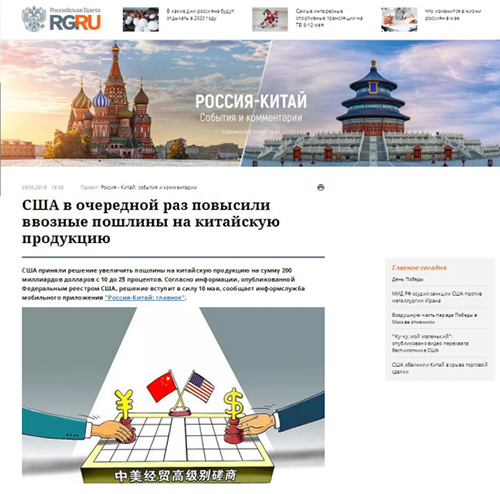
"Russian newspaper" website forwarded on May 9
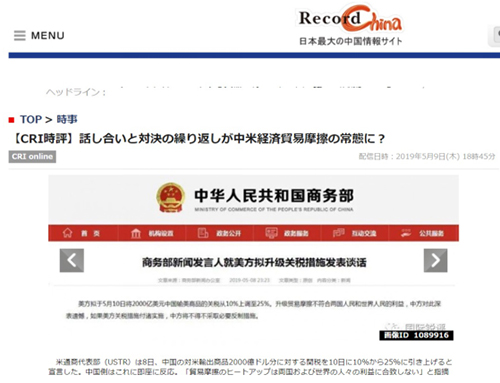
Japan Record China website forwarded on May 9.
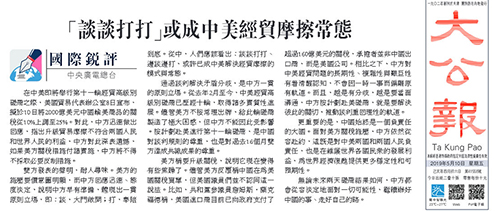
Hong Kong Ta Kung Pao was published on May 10th.
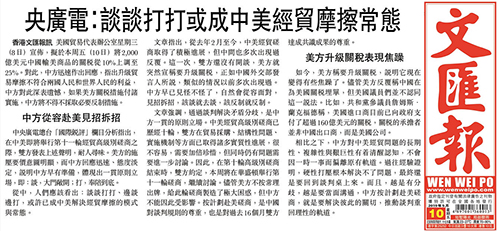
Hong Kong Wen Wei Po was published on May 10th.
The International Critical Review: An attempt to use the Taiwan Province issue to contain China’s adventure is bound to be a dead end.
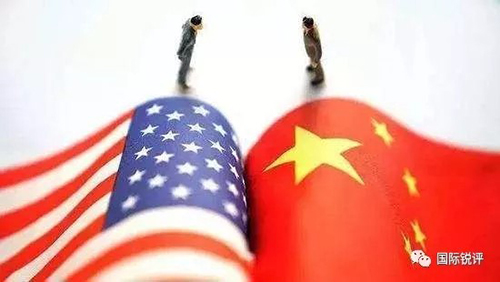
On Tuesday (7th), the US Federal House of Representatives passed the so-called "Taiwan Province Guarantee Act of 2019" and "Reaffirmation of US Taiwan and its implementation of ‘ Taiwan relations act ’ Commitment "resolution, which is an extremely dangerous political action by the United States to use the Taiwan Province issue to rudely interfere in China’s internal affairs and curb the peaceful development of China, once again exposes the extremely bad behavior of some American forces playing politics. If the United States goes its own way, it will seriously damage Sino-US cooperation in important areas and seriously endanger peace and stability in the Taiwan Strait. In this regard, China resolutely opposes and has made solemn representations to the US.
On January 1, 1979, during the term of President Carter, China and the United States formally established diplomatic relations at the ambassadorial level. On the occasion of the 40th anniversary of the establishment of diplomatic relations between China and the United States this year, Mr. Carter wrote an article in Washington post, warning that any misjudgment, miscalculation and non-compliance with carefully formulated rules of conduct by both sides would lead to "worldwide disaster" when the relationship between the two countries entered a sensitive moment. Politicians in the American Congress must know that any adventure that attempts to use the Taiwan Province issue to contain China will be a dead end. Because: it has made three serious mistakes:
One of the mistakes: completely damaged the foundation of the development of relations between China and the United States. In today’s world, exchanges between countries must abide by certain principles and norms, which is the basis for maintaining, stabilizing and upgrading bilateral relations. As the world’s two largest economies and important political forces on the international stage, the more stable and solid the foundation of bilateral relations, the more stable and predictable it will be for the world. This basis was clearly defined in the three joint communiques on the establishment of diplomatic relations between China and the United States, that is, there is only one China in the world, the mainland and Taiwan Province belong to the same China, and People’s Republic of China (PRC) is the sole legal government of China. The U.S. House of Representatives upgraded the former "Taiwan Relations Act" to the "Taiwan Province Guarantee Act" in an attempt to promote military cooperation with Taiwan Province only for sovereign countries, which completely deviated from the one-China principle and seriously undermined the basic norms of international law and international obligations. If this foundation is lost, what can support the development of Sino-US relations? !
Mistake 2: Trying to test China’s bottom line by playing "Taiwan Province". Whenever there are twists and turns or difficulties in Sino-US relations, the Taiwan Province issue will always be put on the table by the United States as a bargaining chip to negotiate, coerce and contain China. This has become a common tactic of some politicians in the United States. It is understandable that the two countries sitting at the negotiating table hold some bargaining chips and strive for the maximization of interests for their respective countries. But the Taiwan Province issue has never been, and will never be, a bargaining chip in resolving Sino-US relations. Because the Taiwan Province issue is an internal affair of China, which concerns the core interests of China and the national dignity and feelings of 1.4 billion Chinese. No foreign forces can interfere in it, let alone trade it. What can be told to the United States is that there is no future in trying to test the bottom line with the Taiwan Province issue.
Mistake 3: It has caused turmoil in the Taiwan Strait and endangered regional peace and stability. In 2018, Democratic Progressive Party, with the concept of "Taiwan independence", suffered a crushing defeat in the "Nine in One" election in Taiwan Province, and lost momentum. Next year, the prospect of the leadership election in Taiwan Province is bleak. At this sensitive moment, the United States offered the "Taiwan Province card" in an attempt to give the "Taiwan independence" forces a lifeline. Some American politicians should carefully read Mr Carter’s article in Washington post and realize that if the Taiwan Province issue is not handled properly, it may escalate into a regional conflict and bring disaster to the world. This statement is not alarmist.
In April this year, the current US President Trump called Mr. Carter and asked the former president how to deal with China. It is reported that one of Carter’s suggestions is "Don’t fight". If American politicians try to break through China’s last red line on the Taiwan Province issue, including sending warships to Taiwan Province, it will be the charge for China to unify Taiwan Province.
The supreme leader of president, China, has repeatedly stressed that China is committed to promoting coordination and cooperation among major powers, expecting them to live in harmony without conflict, confrontation, mutual respect and win-win cooperation. As one of the most important bilateral relations in the world, Sino-US relations are moving forward along the tone of coordination, cooperation and stability, which cannot and should not be changed. Some American politicians should not underestimate Chinese’s determination on the Taiwan Province issue.
Many overseas media forwarded this article:
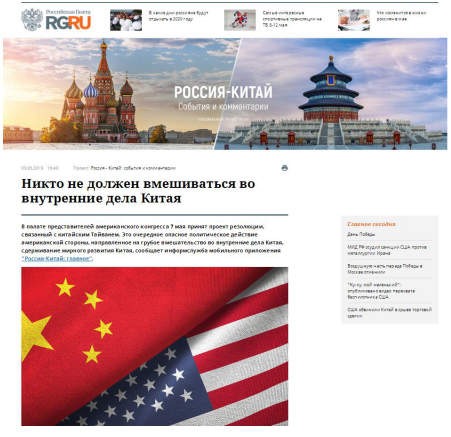
"Russian newspaper" website forwarded on May 9
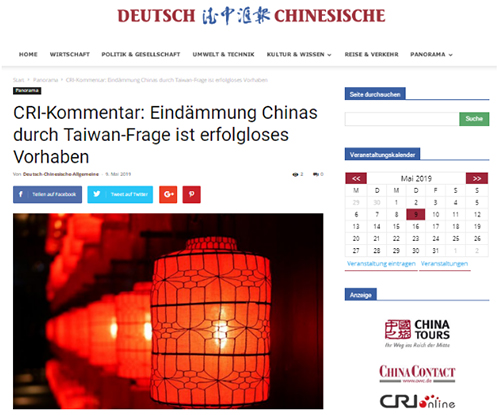
"German-Chinese Report" was forwarded by German website on May 9.
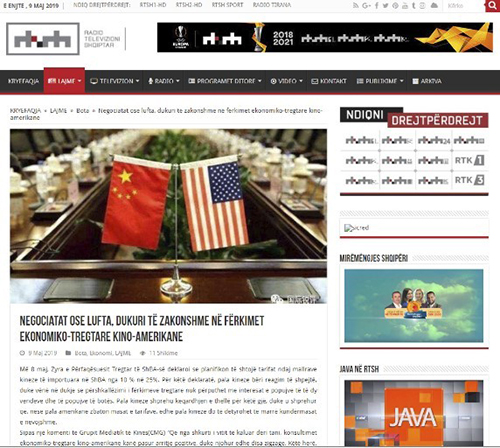
The website of Albanian National Radio and Television Station was forwarded on May 9.
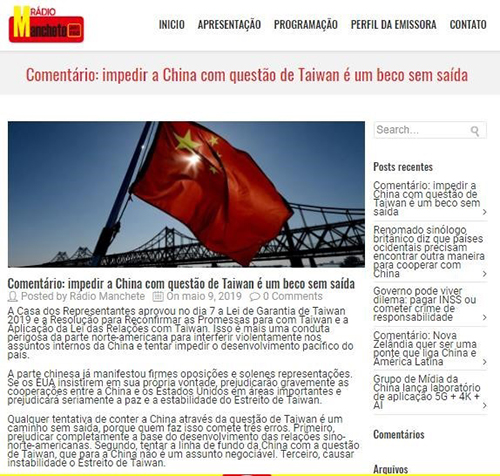
The website of China Radio Station in Rio, Brazil was forwarded on May 9.
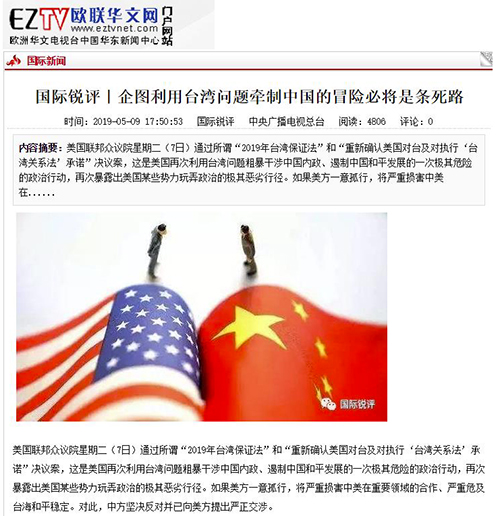
European Union Chinese Network forwarded on May 9.
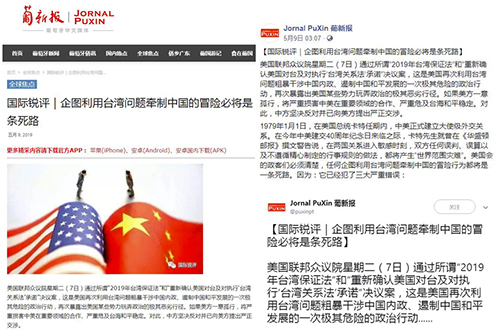
The Portuguese news APP(facebook account, twitter account) was forwarded on May 9.
The contents of "International Sharp Review: Tariff Sticks Harm Others and Harm Yourself" are as follows:
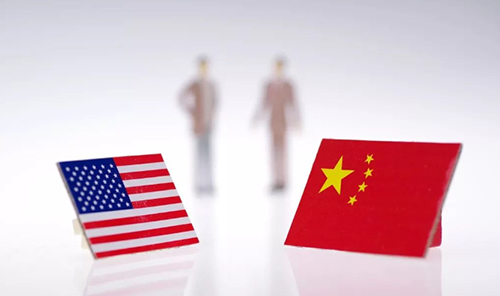
At 0: 01 Washington time on the 10th (12: 01 Beijing time on the 10th), the US tariff on China’s 200 billion US dollars of goods exported to the US was raised from 10% to 25%. In response, China issued a statement at 12: 03 Beijing time on the 10th, almost simultaneously announcing that it had to take necessary countermeasures.
The Sino-US trade war has escalated again, and this result is regrettable. The reason lies in the fact that the United States ignores China’s sincere attitude and actions, and always pursues "America first", asking exorbitant prices and exerting extreme pressure, which fundamentally violates the negotiation principles of mutual respect, equality and mutual benefit, thus leading to the escalation of friction.
Negotiation is a matter for both sides. China has shown its utmost sincerity and done its best with practical actions, but it also needs the US to move in the opposite direction. In fact, Sino-US economic and trade consultations have been going on for more than a year, and China has long learned from the US’s manner. The US should also be well aware of China’s principles and positions, that is, China is unwilling to fight a trade war, but it is not afraid to fight it, and it has to fight if necessary; China is willing to solve the economic and trade differences and frictions between the two sides through cooperation, but such cooperation is principled, that is, it must not harm the core interests of China countries and the fundamental interests of the people.
Today, people must see that when the United States has repeatedly declared that the United States and China have reached a historic agreement, it suddenly insists on escalating tariffs, which is a flagrant violation of its international obligations in the WTO, a blatant challenge to multilateral trade rules, and will further harm the interests of China and the United States and the world, and has been strongly opposed by people around the world, including the American people. Tom Donohue, president of the American Chamber of Commerce, made it clear that he did not support launching a trade war by imposing tariffs, because it was American families and American enterprises who paid tariffs, not foreigners. A lobbying organization representing more than 150 trade associations in the United States-"tariffs hurt the hinterland of the United States" also issued a statement, pointing out that raising tariffs would damage nearly 1 million jobs in the United States and punish American farmers, enterprises and consumers.
The United States once again raised the tariff stick in an attempt to stop the development of China, but it will not succeed. People have seen that over the past year or so, China has responded appropriately, and its economic, social and public psychological resistance has been greatly enhanced. Now there are more positive signals in favor of China in all aspects, and China will respond more calmly, with more confidence and ability to withstand the test of storms. China will create more development opportunities for the world by running its own business well and promoting high-quality economic development with greater reform and higher level of opening up.
Many overseas media forwarded this article:
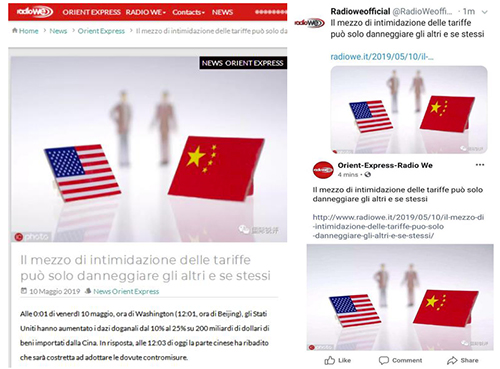
Italian Radio We website (facebook account, twitter account) forwarded on May 10th.
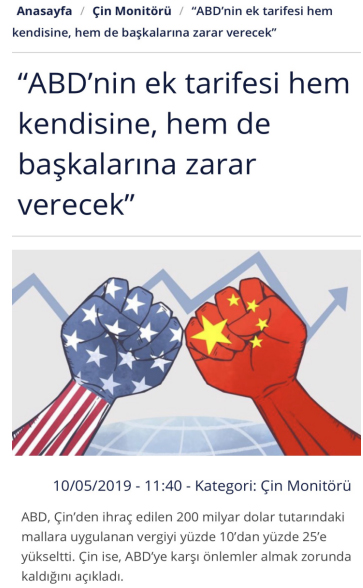
Turkish economic observation network forwarded on May 10
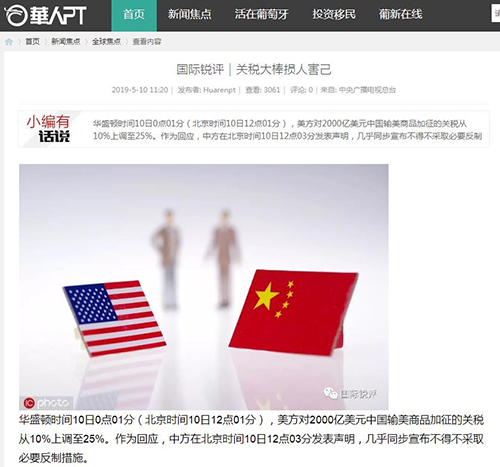
Chinese PT portal website forwarded on May 10th.
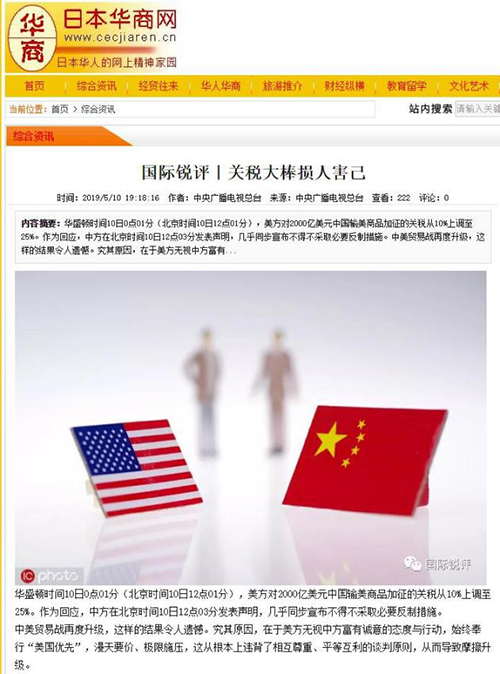
Japan Chinese Business Network forwarded on May 10th.
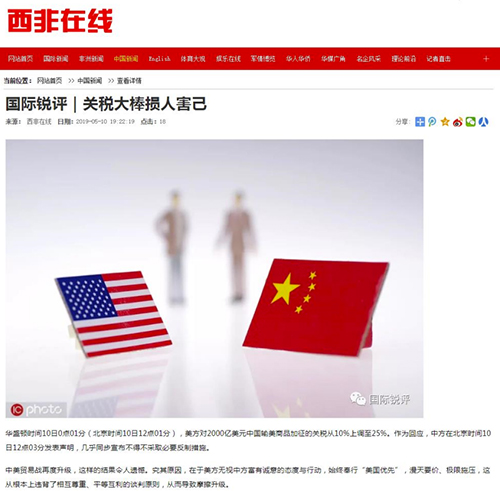
West Africa Online Network forwarded on May 10th.
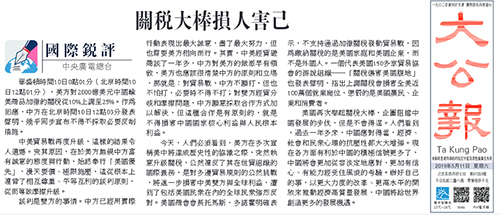
Hong Kong Ta Kung Pao was published on May 11th.

Hong Kong Wen Wei Po was published on May 11th.
The contents of "International Critical Review: The Key to Solving Sino-US Economic and Trade Friction is to Take Care of Each Other’s Concerns" are as follows:
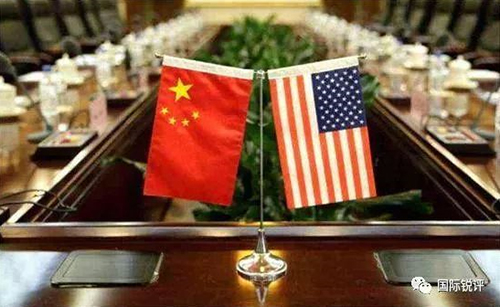
The 11th round of China-US high-level economic and trade consultations ended in Washington on Friday (10th) local time. In an interview after the consultation, Liu He, member of the Political Bureau of the Communist Party of China (CPC) Central Committee, Vice Premier the State Council and Chinese leader of the China-US comprehensive economic dialogue, said that the two sides had good communication and cooperation, and the negotiations did not break down, but on the contrary, this was just a normal minor twist in the negotiations between the two countries, which was inevitable. China was cautiously optimistic about the future of the negotiations. He also revealed that the economic and trade teams of the two sides agreed to meet in Beijing soon to continue communication and promote consultations.
Earlier, at 0: 01 Washington time, the United States raised the tariff on $200 billion of goods exported from China to the United States from 10% to 25%. In response, China issued a statement two minutes later, almost simultaneously announcing that necessary countermeasures had to be taken.
This result is not surprising. Because, since February last year, Sino-US economic and trade consultations have been held for eleven rounds. Although important progress has been made, it has been repeated several times. Talking about fighting may have become the normal state of Sino-US economic and trade friction. Before this round of negotiations, the United States said it would upgrade tariffs, which led to concerns that Sino-US negotiations would break down. Under such pressure, the Chinese delegation still went to the United States to participate in the eleventh round of consultations as scheduled, which itself showed the greatest sincerity in solving the problem and was highly responsible for the interests of the two peoples and the people of the world.
However, the US accused China of trying to renegotiate some contents of the agreement, trying to blame China for the unsuccessful negotiations, which was obviously unfair.
On the one hand, negotiation is a process of exchanging opinions, solving problems and reaching consensus. It is normal for both sides to have different views, and it is normal for them to make changes before reaching an agreement. Therefore, it is even more necessary for the two sides to further discuss to resolve their differences and expand their consensus, instead of using the differences and changes in the negotiation process as the reasons for increasing tariffs. This is obviously an overreaction, wrong prescription, wrong force and artificial obstacles to the negotiation process.
On the other hand, the United States accused China of "retrogression" and labeled China as "abandoning" and "breaking faith". But so far, what China has "promised" is all the words of the United States, and I am afraid there are many elements of China’s "promised". All along, the US side has been talking about whether China meets its economic and trade concerns, but has kept silent about whether it meets China’s concerns, which violates the negotiation principles of mutual respect, equality and mutual benefit, and this is also an important reason for the failure to make progress in this round of negotiations.
China has its own core concerns about Sino-US economic and trade consultations, and it cannot make concessions on these issues of principle. The first is to cancel all the additional tariffs and restore normal bilateral trade. Tariffs are the starting point of Sino-US trade disputes. If an agreement is reached, of course, all tariffs must be abolished. In today’s highly globalized industrial chain, increasing tariffs will inevitably have an impact on the economies of China and the United States, and will also hurt all links in the industrial chain. Over the past year or so, the negative impact of Sino-US economic and trade frictions has proved that there is no winner in the trade war, and adding tariffs is not the solution to the problem. At present, the global voice against imposing tariffs, including the American people, is getting stronger and stronger. The United States should respect China’s demands and take into account the interests of people all over the world.
On the issue of trade procurement, the United States has repeatedly asked China to expand imports from the United States, and even asked China to commit a specific amount. However, China’s expansion of imports should be based on meeting the needs of domestic people for a better life and promoting high-quality economic development. The figures of trade procurement should not only be in line with reality, but also be globally oriented. Any product that is competitive will be welcomed by consumers in China, instead of "buying hard and selling hard".
There is also the text of the agreement, which should include both American demands and Chinese claims, reflecting the balance of the agreement. Moreover, the expression of the text should be accepted by the people in China, and it will not damage the sovereignty and dignity of the country. Only such an agreement can be truly implemented.
As the United States insisted on increasing tariffs, China was forced to counter it, and the Sino-US trade war escalated again. This situation makes China regret, but it is also calm. Over the past year or so, under the pressure of the US tariff escalation, China’s economy has been affected to some extent, but it has been proved that the impact is completely controllable and affordable. In the first quarter of this year, China’s GDP increased by 6.4% year-on-year. In the first four months, the total value of import and export of goods increased by 4.3%, and the main indicators of economic operation such as employment, prices and income were generally better than expected. The International Monetary Fund has raised China’s economic growth forecast by 0.1% to 6.3%, and China has become the only country in the world that has raised its economic growth forecast. Warren Buffett, a famous American investor, recently said that investing in China is ideal, and "there may be some big deployment in the next 15 years".
This information shows that over the past year or so, China has taken appropriate measures to deal with external shocks, which has enhanced its economic resilience, market potential and confidence in investment and consumption. In this regard, Liu He confidently stated that China’s policy tools are sufficient, and China’s economy will maintain a good momentum of steady and healthy development. This means that in the future, China will respond to external challenges more calmly, promote high-quality economic development in accordance with the established deployment, and meet people’s needs for a better life.
It is noteworthy that although China and the United States still have differences on core concerns, they still agree to continue to maintain communication. This shows that after all kinds of twists and turns, both sides have a better understanding of each other’s bottom line and principles, and both have a strong will to continue negotiations to solve the problem. After all, economic and trade cooperation is the ballast stone and propeller of Sino-US relations, and both sides have benefited a lot from it.
In the future, China will continue to communicate with the United States with the utmost sincerity and efforts, strive to narrow differences, expand consensus and push forward consultations. However, this consultation should respect each other’s core interests and major concerns and embody the principle of equality and mutual benefit. Only in this way can China-US economic and trade consultations survive the final stage of the marathon and the "darkness before dawn", and then explore a mode of managing differences and expanding consensus, and promote the construction of Sino-US relations based on coordination, cooperation and stability.
Many overseas media forwarded this article:
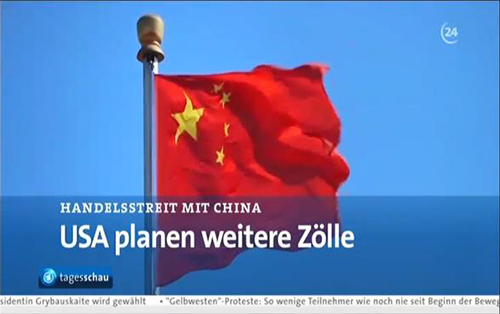
Germany Tagesschau 24 (German Daily News 24 TV) quoted on May 11th.
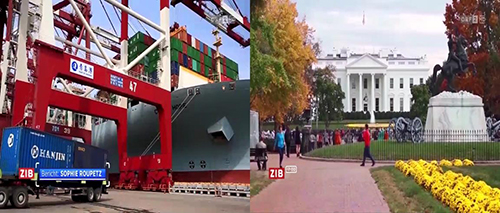
Austrian ORF2 Bundesland (Austrian Broadcasting Corporation Channel 2) quoted on May 11th.

Czech NovaTV Czech HD (Czech Nova TV) quoted on May 11th.

Slovak TV Markiza (Slovak Makisa TV) quoted on May 11

British Al Araby TV (British Al Araby TV) quoted on May 12

South Korea OBS (Korea Jingren TV Station) quoted on May 12

Prima Czech (Prima Czech TV) quoted on May 11
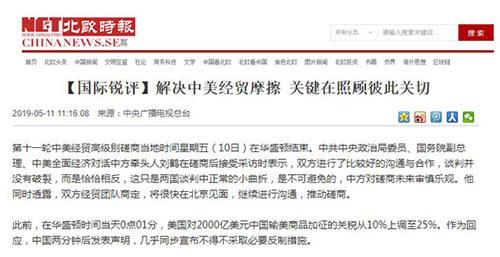
The website of Nordic Times was forwarded on May 11th.
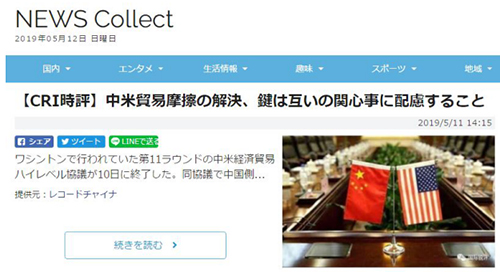
Japan NewsCollect website forwarded on May 11th.
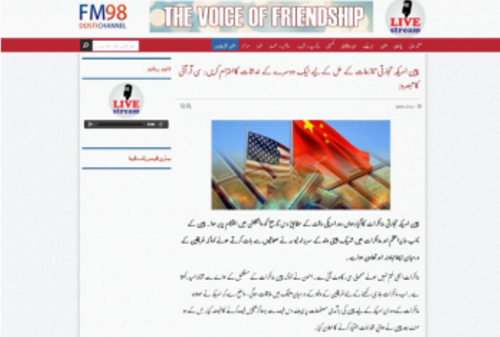
Pakistan-China Friendship Network forwarded on May 11th.
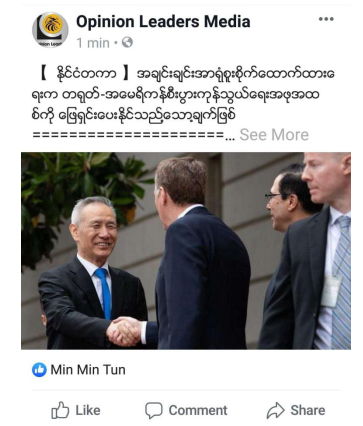
Facebook account of Myanmar opinion leader media was forwarded on May 11th.
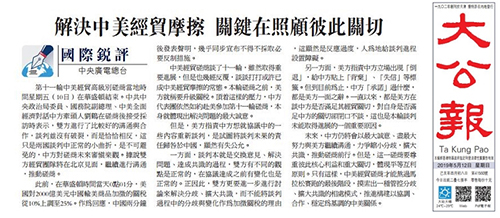
Hong Kong Ta Kung Pao was published on May 12th.
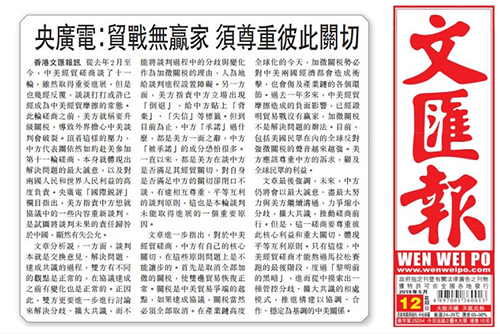
Hong Kong Wen Wei Po was published on May 12th.